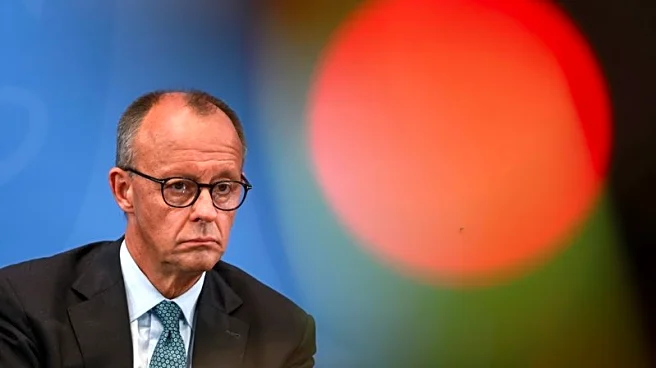By Maria Martinez
BERLIN (Reuters) -Propelled by a 500-billion-euro spending surge and with a clutch of reforms in hand, German Chancellor Friedrich Merz took office in May promising to deliver on a pledge
that his predecessors failed to keep: reviving growth in Europe's largest economy.
But while it was clear that the spending would take time to benefit the economy, there is a growing sense among economists, investors and business groups that the promised reforms are slower and less far-reaching than initially expected.
"If the government wants to increase the underlying potential growth rate durably and notably, it needs to implement much more ambitious structural reforms," said Salomon Fiedler, economist at Berenberg, citing the need to address issues such as an inefficient energy sector, high taxes and regulation.
Ordinary voters are unhappy too: A Forsa poll showed last week that 61% of Germans expect economic conditions in Germany to deteriorate in the coming years, up from 50% in May.
Failure to deliver on economic pledges could deepen public frustration and feed perceptions of ineffectiveness — creating fertile ground for the far-right AfD party, which has begun to top some national polls.
The reform urgency was underlined in August as German unemployment hit three million for the first time in a decade.
One reason for the limited progress may be the reality of coalition. While arch-conservative Merz has long-championed a pro-business agenda, his partners the centre-left Social Democrats (SPD) are more hesitant about reforms that could weaken workers' rights.
Critics say SPD Labour Minister Baerbel Bas' launch of a commission to propose changes to jobless benefits and work incentives by year-end - to be followed by months of parliament debates - is just too slow.
"The government must not hide behind commissions and keep postponing, dragging out and watering down necessary decisions," said Rainer Dulger, head of the BDA employers' association.
Alongside the headline-grabbing 'fiscal bazooka' to fund infrastructure spending, Merz's coalition government promised lower energy prices, tax cuts for businesses and middle- and lower-income households, and scrapping a disputed law requiring businesses to do due diligence on their entire supply chain.
But delivery is falling short, fuelling impatience.
On Wednesday, the cabinet approved changes to the supply chain law - criticised as costly and bureaucratic - instead of scrapping it as pledged.
Similarly, budget constraints mean power-grid fees will be cut by less than promised, and the electricity tax will be lowered for specific sectors but not all consumers.
"By breaking its promise to cut electricity taxes for everyone, the German government is squandering the trust of retailers and consumers," the HDE trade association said.
HOPES UP
Ironically, since the new government took office, one measure of German business sentiment has trended up, reaching a 15-month high in August although still well below its historical average.
Yet analysts point out it is being buoyed by the component of the index built around hopes for the future, while the reading on current conditions actually worsened.
"This fits with the view that it will take some more time for the economic rebound to get under way," said Berenberg's Fiedler, noting that new government spending will not get going before the end of this year and then ramp up from 2026.
Economists welcome the 500-billion-euro infrastructure fund and an "investment booster" approved in June - a package of measures such as better depreciation options for companies - plus extra defence spending and a planned cut in corporation tax.
But overall, only a quarter of 170 economists surveyed by Ifo gave the government's economic measures a positive rating, with 42% of them outright negative, criticising the lack of a plan to address deep-rooted issues like rising pension costs.
A summer run of weak data has given a sobering view of the government's progress. The economy contracted in the second quarter, further dimming expectations of a sustained recovery, and exporters must now face the impact of new U.S. tariffs.
Industrial output fell in June to its lowest since 2020 amid weak foreign demand and rising Chinese competition. An EY study shows Germany has lost 245,500 industrial jobs since 2019.
German investor morale also fell more than expected in August, amid widespread disappointment with the European Union-U.S. trade deal.
The fact that Merz's coalition has at least been able to pass budgets for this year and next is a sign that his conservatives can work with the Social Democrats to get policies over the line, said Franziska Palmas, senior Europe economist at Capital Economics.
"But it still remains to be seen whether quick reform will be a priority in practice," she said.
A string of rows on other issues ranging from tax and welfare reform to reinstating mandatory military service has convinced some that Merz, like his predecessor Olaf Scholz, will struggle to produce substantial reforms.
“While Chancellor Friedrich Merz has announced 'an autumn of reform', I suspect that ideological differences will continue to limit coalition cohesion and meaningful reform," said Mujtaba Rahman, managing director for Europe at Eurasia Group.
(Reporting by Maria Martinez; editing by Mark John and Toby Chopra)










